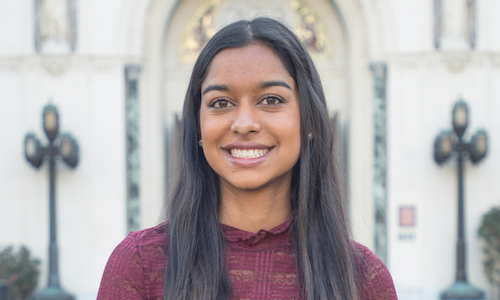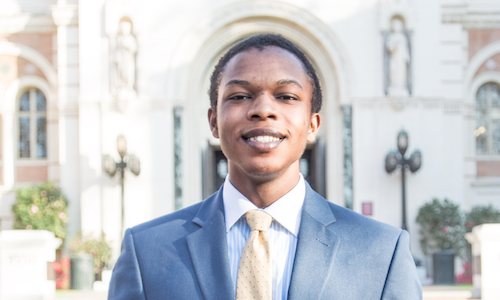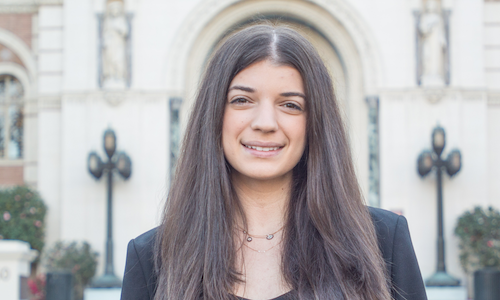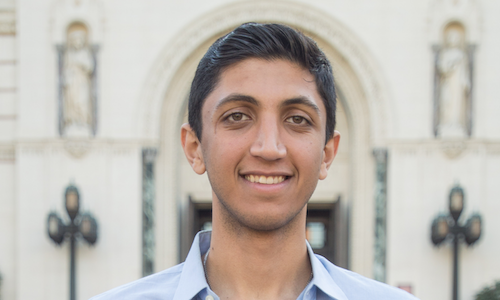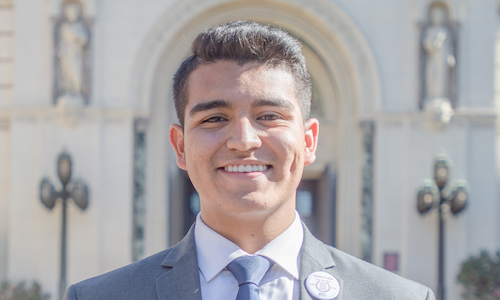
Meet the presidential tickets
Debbie Lee and Blake Ackerman
Lee is a sophomore with a major in Political Science and a minor in Social Entrepreneurship, and Ackerman is a sophomore majoring in Business Administration.
If elected, Lee says their focus is to listen and learn.
Ackerman believes her ticket's platform points are feasible.
Safety & Wellness
- Diversity and sexual assault training for faculty and staff
- Speed bumps on Greek row
- Formalized system to ensure safety at Greek life events
- Plan B vending machines at Engemann
- Rest and meditation spaces on campus
- Increased parking options for commuter students
- Creation of a Transfer Resource Center
- Expand cultural resource centers
- Increased collaboration between USG and other student organizations
- Weekly luncheons with different student leaders and campus groups
- Diversity hiring metrics in USG
- On-campus economic crisis response team
- Bereavement excuse
- Monitoring First Year Student Development Course pilot program
- Greek-University relationship statement
- Increase access to composting and recycling bins
- Effective dining hall food disposal system
- Increase tuition transparency
There's so much to be learned when you listen to someone...and see how we can incorporate them into the conversation.Debbie Lee
Mai Mizuno and Brianna Bozek
Mizuno is a junior majoring in International Relations and Philosophy, Politics, and Law, and Bozek is a junior majoring in Business Administration and minoring in Music Industry.
Mizuno says working in USG has always been about advocating for students.
Bozek's aims on working to improve the school and address student concerns.
Residential & Hospitality
- Dining and discretionary dollars in USC Village
- Extend campus housing availability after finals
- Program events and outreach initiatives in USC Village
- Increased parking options for commuter students
- Free menstrual products in campus restrooms
- Increase transparency of student health fee
- Increase accessibility to counseling services
- Standardize wait times for general health appointments
- Food waste awareness campaign
- Facilitate active shooter training
- Promote use of Title IX Office’s new resources
- More recycling bins on campus
- Work with Greek Life regarding new eligibility requirements
- Separate Veterans resource center with full-time staff
- Transfer student resource center
- Improve transition period for international students
- LGBTQ+ center with more physical space
- Advocate for leadership stipend
- Public office hours, town halls and roundtable talks
- Transfer student resource center
- Require USG Senators to attend meetings of non-USG student organizations
- Record Senate agenda and meeting minutes for public viewing
Meet the Candidates for Senate
Although some Senate candidates are running on a slate, they can be elected individually.
The candidate platforms and quotes have been shortened for clarity.
|
Matt Crane and Diviya Gupta
|
Michaela Murphy, Amy Chong and Gabriel Savage
|
|
Manda Bwerevu, Jillian Halperin and Jacquelyne Tan
|
Max Geschwind
|
Shayan Kohanteb
| <
Neal Sivadas
|
Meagan Lane
|
Andre Luna
|
Will Sherman
|
Cody Ela
|
Student government leaders must be defined by their dynamism. On the one hand, they must act as administrators, curating and developing the larger institution to work toward various measures; on the other, they must remain activists — as grassroots and impassioned as those without an office or title, fighting equally as hard, cognizant of the same stakes. Above all, they must be able to work on behalf of the large and diverse student voice. They must seek to produce the change that is so often necessary, and yet so rarely easy to achieve.
Undergraduate Student Government presidential candidate Mai Mizuno and her running mate Brianna Bozek share a vision that prioritizes tangible, concrete action to improve student life, while acknowledging the needs of the local community. Their 37 platform points comprise a litany of progressive measures including community, diversity, expansion of resources and, above all, an eye on the needs of largely forgotten student groups. After interviews, extensive research and analysis of the specifics of the impressive records of service of this year’s candidates, the Daily Trojan has decided to endorse Mizuno and Bozek to serve as next year’s USG president and vice president.
TThe Editorial Board was particularly impressed by Mizuno’s passion-driven track record, and her on-the-ground style of activism and engagement emphasizing underrepresented voices and diverse student needs. Her work to expand resources for lower-income and food and housing-insecure students by partnering with the Electronic Benefits Transfer and CalFresh programs was a successful example of the manners in which student government can significantly and directly impact student experiences.
The Mai & Brianna ticket has emphasized sexual assault prevention and expanded resources for survivors; greater diversity and representation within USG; direct collaboration with cultural assemblies; expanded access to mental and reproductive health resources; and improved resources for students to understand and manage tuition. If Mizuno applies the same efficacy, compassion and innovation to these projects as her EBT/CalFresh success, it seems certain the campus will see positive change.
The two presidential tickets share many of the same platform points. However, as the records of previous presidential administrations demonstrate, vision alone will not translate to change.TThe two presidential tickets share many of the same platform points. However, as the records of previous presidential administrations demonstrate, vision alone will not translate to change. It matters that the Mai & Brianna ticket boasts a record of accomplishments in student government, strong relationships with key campus leaders and experience impacting change alongside an administration that so often remains unwilling to address student need. Mizuno and Bozek are not only the ticket with the right vision, but also the advocates with the strength and clout to see their vision to fruition.
With a platform thoughtfully separated into short-term and long-term goals, the Mai & Brianna ticket knows the limits of what can be accomplished in a single year. However, they remain undaunted by perceived limits, and speak confidently about their plan to achieve long-term goals by extending their passion and activism into training and mentorship to guide future generations of leadership. They express a readiness to finish projects which began in previous administrations, and set the frameworks for future administrations to finish long-term goals of their own.
Mizuno’s nearly three-year record in student government is a reflection of her ability to guide projects to the finish line. In the process of implementing her program to address food insecurity, Mizuno researched and communicated with vendors around a two-mile radius of the University Park campus to convince providers to accept food stamps, keeping record of participating institutions to communicate location information with students in need via a free, widely accessible online map.
She has collaborated with administrators to expand gender-neutral housing options, and was instrumental in planning and presenting a USG bill to provide free menstrual products in central on-campus restrooms.
Personal experiences also guide crucial components of Bozek’s focus, having formerly worked as a campus tour guide and the Panhellenic Council Vice President of Service and Philanthropy. She has said her own struggles with the Engemann Health Center’s limited mental health resources have made expanding access to these services a priority of the ticket and personal passion of hers.
But a particular interest of the Mai & Brianna ticket is advocacy with regard to yearly tuition hikes. Mizuno is bravely open about her family’s struggles in the face of a tuition hike in her freshman year, and how this experience drove her to grassroots activism. The Mai & Brianna ticket is intent on demanding transparency from the administration, especially where their annual budget report is concerned. Written in unnecessarily complex financial jargon often to obfuscate the most crucial data, these reports seem to be purposefully indecipherable to those without a background in finance.
Mizuno and Bozek plan to enlist those with competency in the language to release a simplified and digestible version of the report, in addition to implementing and raising awareness about free financial literacy courses for students seeking to take greater control over their financial futures. Most importantly, they are committed to demanding a tuition freeze from the University — a much-needed, long-awaited change.
The needs of student groups without significant financial clout or numerical representation too often fall by the wayside. We are, more often than not, expected to conform to newly-imposed realities such as tuition hikes and condensed resources rather than forge a path that meets our needs. But Mai & Brianna are the ticket that remains undaunted by challenges and armed with the most valuable experience; the Daily Trojan recommends that we, with the power of our collective voice, entrust Mizuno and Bozek to spearhead the way toward that future.

By Maverick Freedlander
After a year, the terms of Undergraduate Student Government President Austin Dunn and Vice President Morgan Monahan are coming to an end. During their presidential campaign, the two advocated their vision to “Achieve More” as representatives of the 19,000 undergraduate students they serve. Some of the progress Dunn and Monahan have made, via resolutions in the Senate, include the creation of a fall break initiative, the implementation of free hygiene products in campus restrooms and a rideshare partnership between USC and Lyft.Despite these accomplishments, Dunn and Monahan agreed the most defining moments of their term occurred in the face of spontaneous crises.
“The biggest thing that strikes me this year is responding in real time to all of the issues that happened in our nation, because it affects communities and students on our campus,” Monahan said. “So, for instance, DACA was a big thing that we pulled together really quickly to support students.”
When the Trump administration announced its decision to end the Deferred Action for Childhood Arrivals program, the USG Senate passed a resolution to allocate $10,000 to aid DACA students’ application renewal fees.
While the DACA fund was a highly publicized amenity to students, Monahan expressed concern regarding a general lack of student awareness of on-campus resources, such as free legal counseling and complimentary shuttles to LAX. She and Dunn each referenced examples of USC students who had learned about these useful resources too late in their academic career.
“It is definitely an ongoing battle,” Dunn said. “We want to institutionalize initiatives that come out of USG in order to make them a part of campus culture, which would take some of the publicity efforts out of our hands.”
To address this, Monahan repeatedly cited the upcoming mandatory first-year wellness course as a potentially useful tool to inform incoming Trojans of the resources available on campus.
“I would say something that really spoke to me this year is that there is definitely a culture change happening on our campus,” Monahan said. “And I think one of the big catalysts of that is the first-year course initiative that we’re trying to do.”
Mental health and mindfulness were key issues addressed across USG this year, in several initiatives such as free access to the Calm mobile app — which promoted mindfulness and meditation — and the passing of a fall break resolution. Although it will not be implemented until 2019, the fall break initiative was strongly supported by students and serves the purpose of alleviating academic stress and improving mental health.
“We actually had a meeting with Provost Quick on Jan. 25 and we got a date for fall break,” Monahan said. “It’s going to be the fall semester of 2019 in week eight.”
The idea of a fall break is one that spawned and receded several times over the past five years, but a resolution finally passed the USG Senate, Graduate Student Government Senate, Academic Senate and Faculty Senate in Fall 2017. Much of the force behind this initiative was provided by an Engemann Health Center study, which showed that a spike in demand for counseling repeatedly occurs from weeks 8 to 10 in the fall semester.
Dunn recognized the current confusion regarding when the new fall break will be implemented among students and faculty, and hopes to address it by the end of his term.
“Our hope is, before the end of our term, to have a memo released to the entire university community signed by us and the provost making that totally publicized,” Dunn said.
Monahan elaborated on her vision for how the first-year wellness course can create a safer, better-informed and more tolerant atmosphere on campus.
This first year course for all incoming freshman, spring admits, and transfer students will really create a culture of accountability, looking out for each other, and respect. And culture doesn’t happen in a vacuum. It’s going to be impacted by things that happen on campus.“This first year course for all incoming freshman, spring admits, and transfer students will really create a culture of accountability, looking out for each other, and respect,” Monahan said. “And culture doesn’t happen in a vacuum. It’s going to be impacted by things that happen on campus.”Morgan Monahan
Dunn said the shifting norms on campus were his and Monahan’s favorite development during their administration. He referred to the fall break resolution as an example of how this progress is manifesting.
“If we had to sum up what we are most proud of, in one word, it would be culture,” Dunn said. “Just because these things we’re listing have to do with that. Fall break focused on destigmatizing mental health and supporting our students in times of crisis in weeks eight to ten.”
In the aftermath of Christina Yokoyama’s termination as the former director of the Norman Topping Student Aid Fund, many USG officials and students questioned the ability of students to influence decisions made by the USC administration. Dunn acknowledged these concerns, and explained he has tried to address them by meeting with administrators more often.
“In my entire time as vice president [during the 2016-2017 term], I only saw [Vice President for Student Affairs] Ainsley Carry three times,” Dunn said. “I now see him weekly, usually even more than once a week. I couldn’t ask to be better supported by the provost. In that realm, that is definitely something that we have made great strides in but that’s not to say that everything we say to the provost, Dr. Carry, or [President C.L. Max] Nikias is immediate policy.”
When asked what advice she would offer to the current USG candidates, Monahan emphasized personal wellness and trying to preserve oneself.
“Wellness is an important aspect of this and making sure that you fill up your own cup before you fill up others,” Monahan said. “And just make sure you are reaching out to as many people as possible, but doing it in a responsible manner for yourself.”
Dunn added that candidates ought to remember what prompted them to join student government, and to stay true to those motives.
“I think you have to stay true to your purpose and your why,” Dunn said. “Every student who’s running or who gets involved in student government has a reason for having done so. And I think that one thing that campaigns and the dirtiness of elections and the stress of life can often take away from staying at your core.”
Dunn concluded by reminding the next USG president to seek assistance from all members of USG, and to work on every issue as a team, regardless of who receives the spotlight.
“Even though I might be the first point of contact on a particular issue, or I might have to give a speech on a particular thing, I am never doing that as me; I am always doing that with USG as my team,” Dunn said. “To know that you have the support of your team behind your back is pretty great. My biggest piece of advice is to rely on the amazing people around you.”

